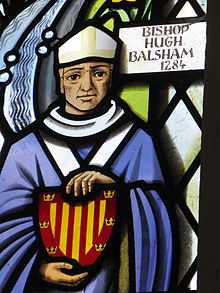Hugh de Balsham
| Hugh de Balsham | |
|---|---|
| Bishop of Ely | |
 Hugh Balsham shown in a window at Thriplow church in Cambridgeshire | |
| See | Diocese of Ely |
| Elected | 1256 |
| Term ended | 16 June 1286 |
| Predecessor | William of Kilkenny |
| Successor | John Kirkby |
| Orders | |
| Consecration |
14 October 1257 by Pope Alexander IV |
| Personal details | |
| Died |
16 June 1286 Dodington manor |
| Buried |
24 June 1286 Ely Cathedral |
| Denomination | Catholic |
Hugh de Balsham (or Hugo; died 16 June 1286) was a medieval English bishop.
Life
Nothing is known of Balsham's background, although during the dispute over his election he was alleged to have been of servile birth. He was a Benedictine monk at Ely,[1] and appears first as sub-prior of the cathedral chapter there.[2] On the death of William of Kilkenny in 1256 the monks elected him Bishop of Ely, to the annoyance of King Henry III of England and Boniface of Savoy, the Archbishop of Canterbury. Boniface declared the election invalid, and attempted to install Adam Marsh into the see. Both sides appealed to Rome.[1] The election was confirmed by Pope Alexander IV in 1257.[2]
Balsham was consecrated on 14 October 1257[3] by the pope. Balsham also promised that he would visit Rome every three years, but he was released from this promise in 1278.[1]
Balsham legislated against the sale of the sacraments.[4] He was present at the Parliament held at London in June 1264 that set up the government of Simon de Montfort.[5] Much of Balsham's time was spent in repairing damage done to his diocese by various people, first the royal administrators during the election dispute, and then later some of the baronial supporters who occupied the Isle of Ely in 1265. The bishop issued statues for his diocese, and worked to improve the administration of the diocese. He promoted the cult of Ethelreda, the local saint of Ely. Gifts to the monks of the cathedral chapter as well as to churches in his diocese contributed to his reputation as a good bishop.[1]
Balsham played an important role in the early history of Cambridge University. In 1280 he obtained a charter from the king allowing him to replace the secular brethren residing in the diocesan hospital of St John at Cambridge by "studious scholars"; a second charter four years later entirely differentiated these scholars from the brethren of the hospital,[1] and for them Balsham founded and endowed the college of Peterhouse,[6] the first Cambridge college. He left 200 pounds to the college in his will.[1]
Balsham died on 16 June 1286[3] at the manor of Dodington on the Isle of Ely. He was buried in Ely Cathedral on 24 June 1286. A brass in the church at Balsham, Cambridgeshire, supposedly depicts the bishop.[1] An unidentified tomb slab now in Ely Cathedral has sometimes been identified as his, but this identification is not secure.[7]
Citations
- ↑ 1.0 1.1 1.2 1.3 1.4 1.5 1.6 Owen "Balsham, Hugh of (d. 1286)" Oxford Dictionary of National Biography
- ↑ 2.0 2.1 British History Online Bishops of Ely
- ↑ 3.0 3.1 Fryde, et al. Handbook of British Chronology p. 244
- ↑ Moorman Church Life in England p. 228
- ↑ Powell and Wallis House of Lords p. 195
- ↑ Moorman Church Life in England p. 161 footnote 2
- ↑ Sayers "Once 'Proud Prelate'" Journal of the British Archaeological Association p. 78-79
References
- British History Online Bishops of Ely accessed on 25 October 2007
- Fryde, E. B.; Greenway, D. E.; Porter, S.; Roy, I. (1996). Handbook of British Chronology (Third revised ed.). Cambridge, UK: Cambridge University Press. ISBN 0-521-56350-X.
- Moorman, John R. H. (1955). Church Life in England in the Thirteenth Century (Revised ed.). Cambridge, UK: Cambridge University Press.
- Owen, Dorothy M. (2004). "Balsham, Hugh of (d. 1286)" ((subscription or UK public library membership required)). Oxford Dictionary of National Biography. Oxford University Press. doi:10.1093/ref:odnb/1250. Retrieved 2 April 2008.
- Powell, J. Enoch; Wallis, Keith (1968). The House of Lords in the Middle Ages: A History of the English House of Lords to 1540. London: Weidenfeld and Nicolson.
- Sayers, Jane (2009). "A Once Proud Prelate: An Unidentified Episcopal Monument in Ely Cathedral". Journal of the British Archaeological Association 162: 67–87. doi:10.1179/006812809x12448232842376.
Further reading
- Ullmann, Walter (1949). "The Disputed Election of Hugh Balsham, Bishop of Ely". Cambridge Historical Journal 9 (3): 259–268. JSTOR 3020759.
| Catholic Church titles | ||
|---|---|---|
| Preceded by William of Kilkenny |
Bishop of Ely 1256–1286 |
Succeeded by John Kirkby |